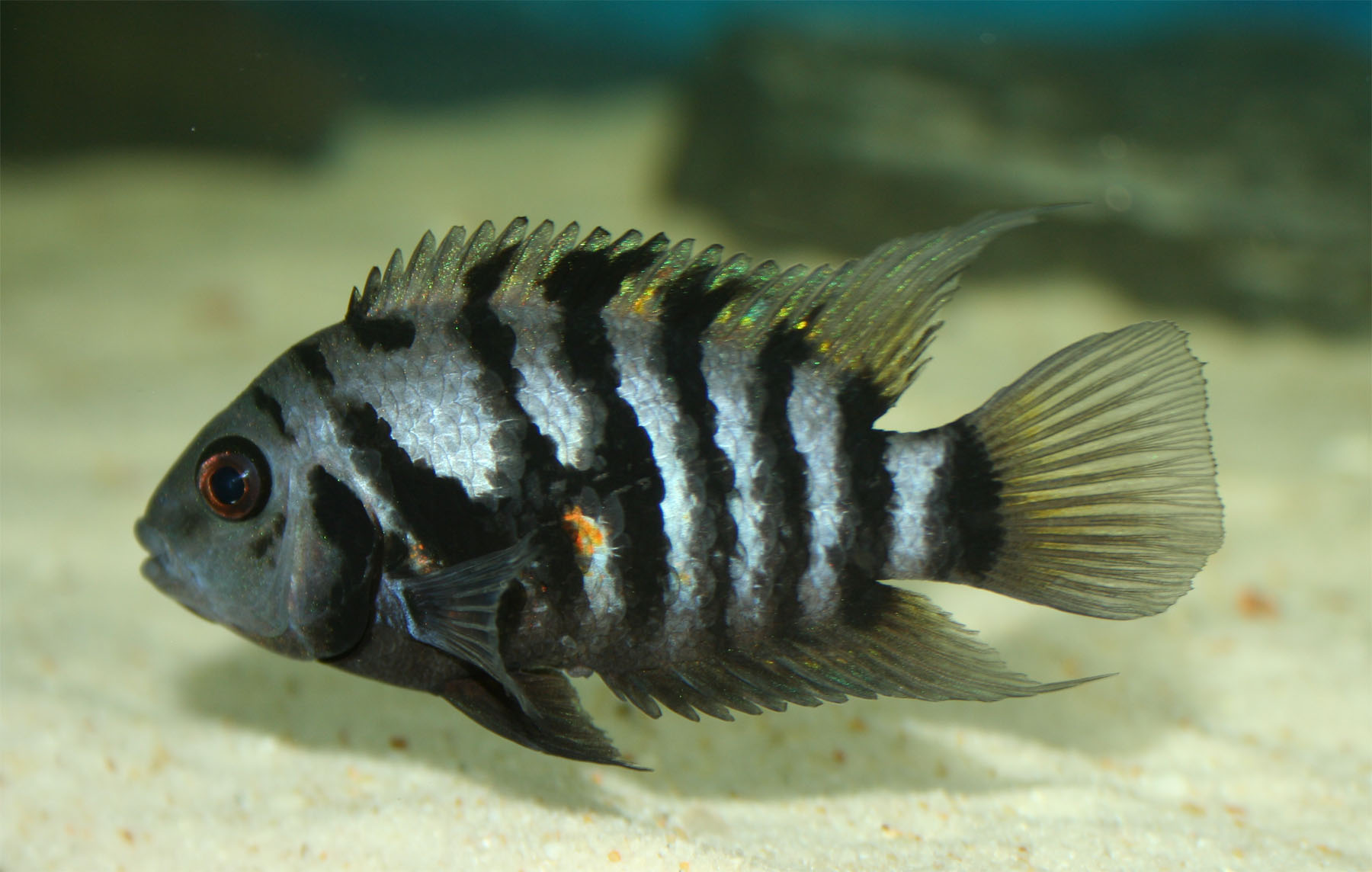
Convict Cichlid Fish The Care, Feeding and Breeding of Convict
Convict Cichlids are Central American Cichlids found in lakes and streams of Costa Rica to Panama. Although there are many different types of convict cichlids, their general scientific name is Amatitlania nigrofasciata, meaning a black-striped cichlid. Another name that they may go by is Zebra cichlid. This is due to their white body with black.

Frontosa Cichlid female Black convict Cichlids Albino Tiger Oscar
The Convict Cichlid most commonly has a grey to silver body with multiple black vertical bars along the length of its body. These fishes may have iridescent patches along their elongated anal and dorsal fins. During breeding, female Convict Cichlid bellies may be slightly orange or red. There is an "albino" variety bred in the aquarium.

Albino Convict Cichlid in Aquarium Stock Image Image of freshwater
The convict cichlid ( Amatitlania nigrofasciata) is a fish species from the family Cichlidae, native to Central America, [2] also known as the zebra cichlid. [3] Convict cichlids are popular aquarium fish [2] and have also been the subject of numerous studies on fish behaviour. [4]

LARGE Pink Albino White Convict Cichlid BREEDING PAIR (Two fish total
The convict cichlid is one of the most popular members of the Cichlidae family behind oscars and angelfish. Their popularity in the fishkeeping world is due to their hardiness, low care needs, and vibrant coloring. It also makes an outstanding beginner breeder fish due to their receptiveness to mate. Males will grow up to 6 inches long and.

Albino Convict Cichlid Hollywood Fish Farm Online
Convict Cichlid Appearance. Convict Cichlids are quite flashy-looking fish for their size. Featuring a greyish-blue body with usually around 8 broad black vertical bars that are evenly spread along the body length, they do resemble a fish in a prison uniform. While there are variations in colors available, this is the classic Convict and the.

Convict Cichlid Who Gives A Fish
Also known as Albino Convict Cichlid, Amelanistic Convict Cichlid, Black Convict Cichlid, Convict, Pink Convict Cichlid, White Convict Cichlid, Zebra Cichlid. Found in the shallows, amongst debris and roots of small creeks, warm pools, large streams as well as fast flowing rivers. They feed on crustaceans, fish, insects, plant material and worms.
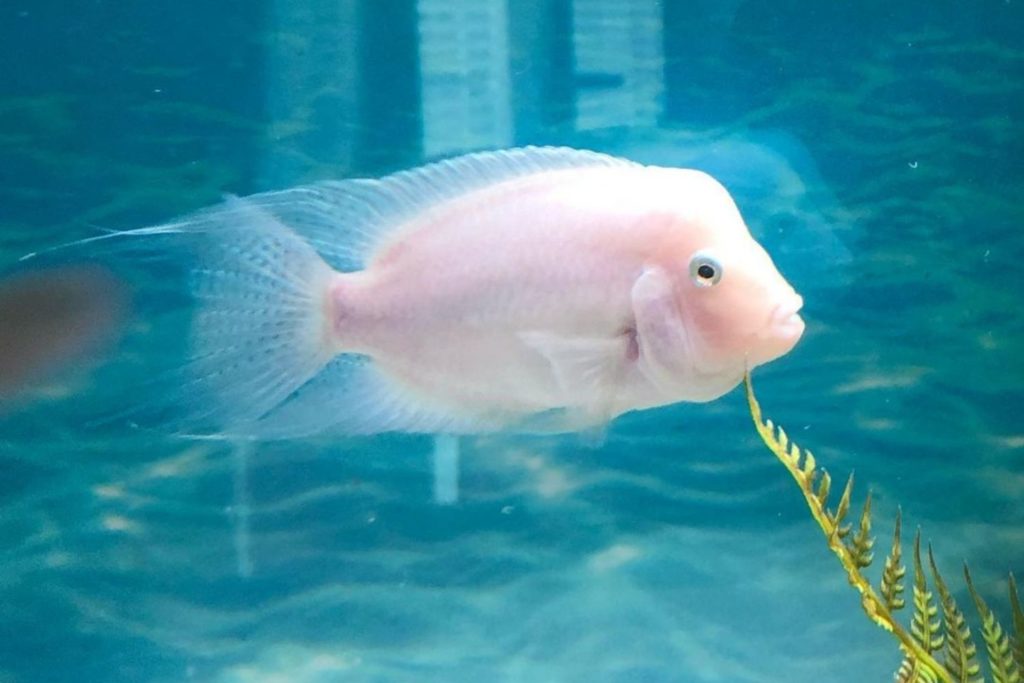
Convict Cichlid Care, Size, Lifespan, Food & More
Consistently elevated stress levels take their toll over the years. Happy fish = healthy fish! Water Parameters. The convict cichlid is a very hardy fish that can tolerate a wide range of water parameters. This makes caring for them a little bit easier and gives you a little bit of flexibility when it comes to tank mates (more on that later).

Albino Convict Cichlid (Amatitlania nigrofasciata) — Stock Photo
Temperature. 75 to 79°F (24 to 26°C) pH. 6.0-8.0. Care level. Easy. Pink convict cichlid is the pseudo-albino version of the Archocentrus nigrofasciatus convict cichlid. Let's be clear that it's not entirely a man-made variant. Pink convict cichlids are selectively-bred, naturally occurring variants.

Albino Convict The Fish Guy
These fish have visible and prominent dorsal and anal fins, making them look like a sail while they swim. Hence, this makes them more attractive to pay attention to. Color Of Convict Cichlid. This fish comes in various colors: pink, white, and the pseudo albino variety. Cream convicts are available as well.
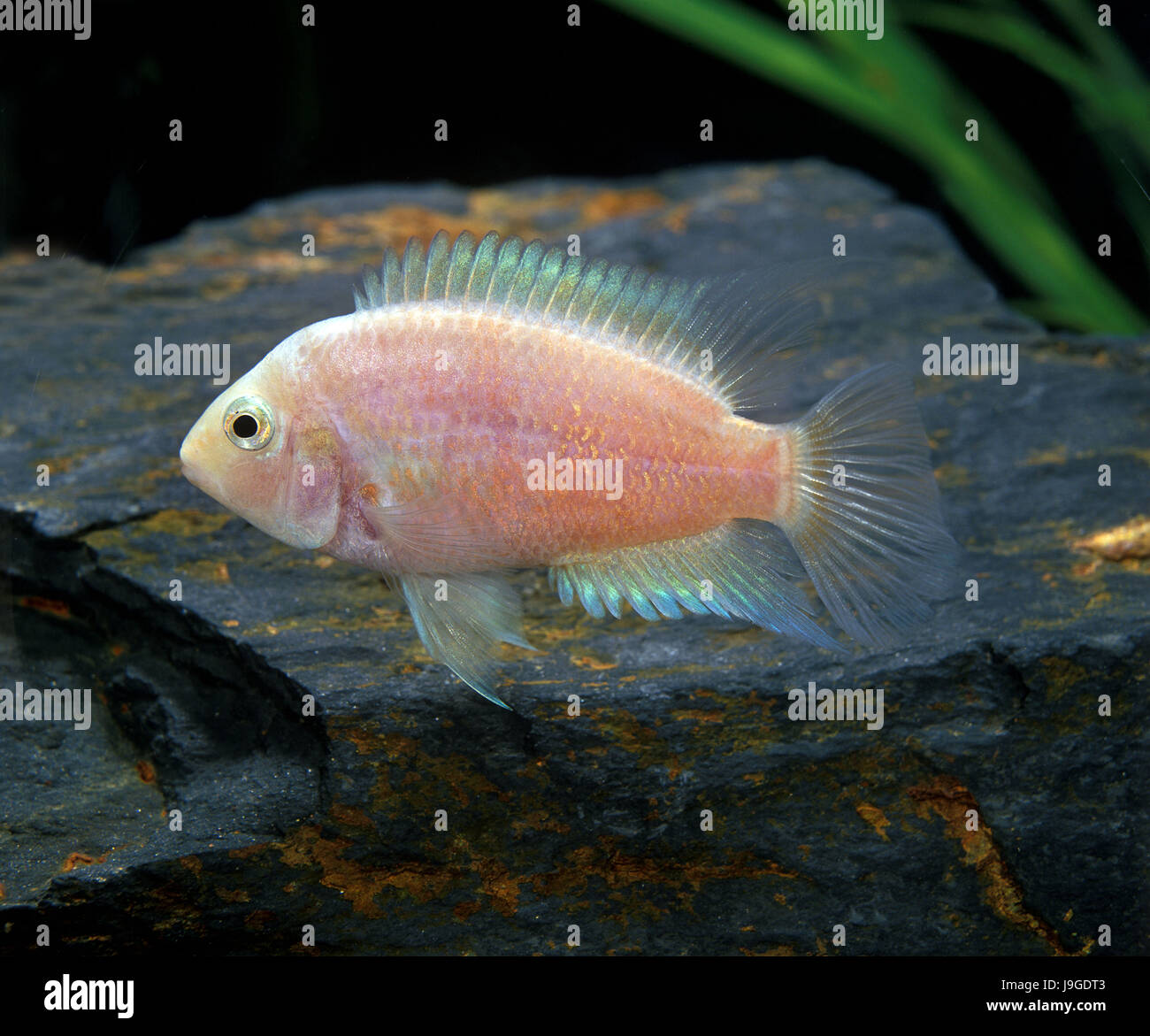
Albino convict cichlid hires stock photography and images Alamy
Convict Cichlid Fish Care Details. Scientific Name : Amatitlania nigrofasciata. Common Names : Convict, Zebra Cichlid, Albino Convict. Care Level : Easy. Size : Up to 4 inches (10 cm) pH : 7 - 8. Temperature : 70°F - 80°F (21°C - 27°C) Water Hardness : 10° to 15° dH. Lifespan : 8 - 10 years, maybe slightly longer.

Albino convict cichlid and fry YouTube
The females display brighter colors while the males are generally bigger fish. Many different varieties have been bred in captivity, and these include the Albino Convict Cichlid as shown in the image below. These Cichlids are best kept with other aggressive fish, that are big enough not to be eaten.
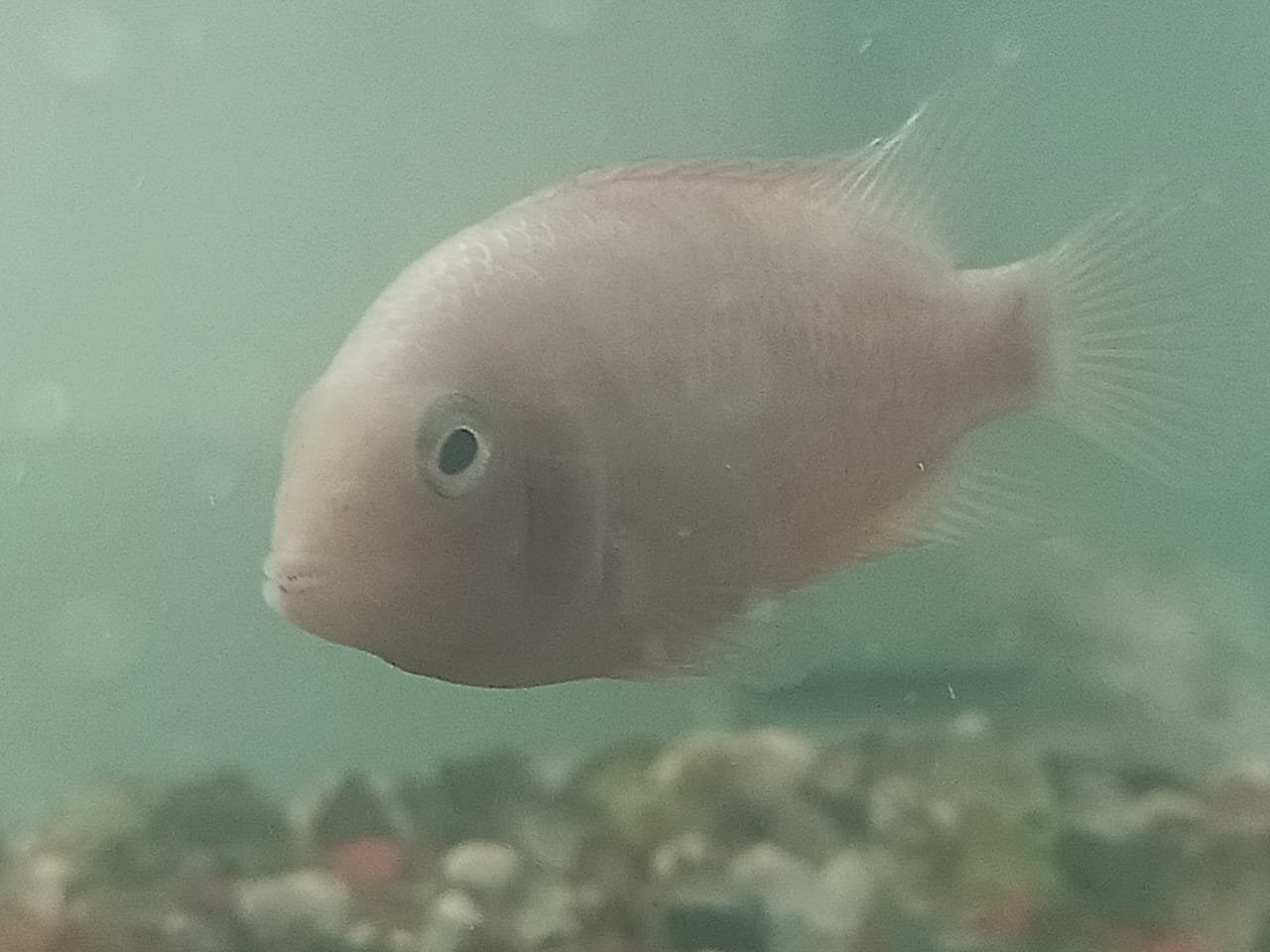
Albino Convict Cichlid Splashy Fin Live Fish Bangalore Only Shipping
Albino Convict Cichlid: This variant has a pink or orange body color with red eyes, it is a result of a genetic mutation that causes a lack of pigmentation.. a renowned ichthyologist and herpetologist in the 19th century and was the first to formally describe a wide range of fish species including the convict cichlid.

My Albino Parrot Fish/ Convict Hybrid Parrot Fish, Albino, Lovers, Pets
The Albino Convict Cichlid is an omnivorous fish, meaning it consumes a mix of plant matter and small aquatic creatures. In the wild, their diet consists of insects, crustaceans, and algae. To replicate this diet in captivity, offer a variety of high-quality pellets, flakes, and frozen or live foods..
/GettyImages-611629286-9095cfe724ea469eac6924a99d03ec76.jpg)
Convict Cichlid Fish Species Profile
The Albino Convict Cichlid is a popular aquarium fish because it is easy to care for and is very hardy. Albino convict cichlids are a beautiful freshwater fish that are popular in the aquarium trade. They are native to Central America and their natural habitat is rivers and streams. Albino convict cichlids are a peaceful species that can live.
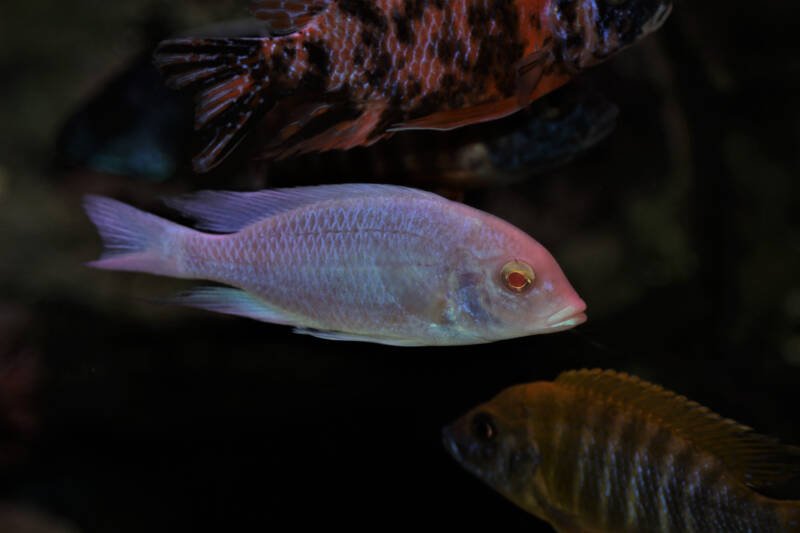
Convict Cichlid Care Setup, Diet & Breeding (with Pictures)
FRESNO, Calif. (KSEE/KGPE) - Court documents detail the horrors and dangerous nature of an illegal lab found in Reedley, California, exposed several months ago by a city code enforcement officer. What was found inside prompted the fire chief to send a letter to city officials describing it as a "potential disaster for the city.".
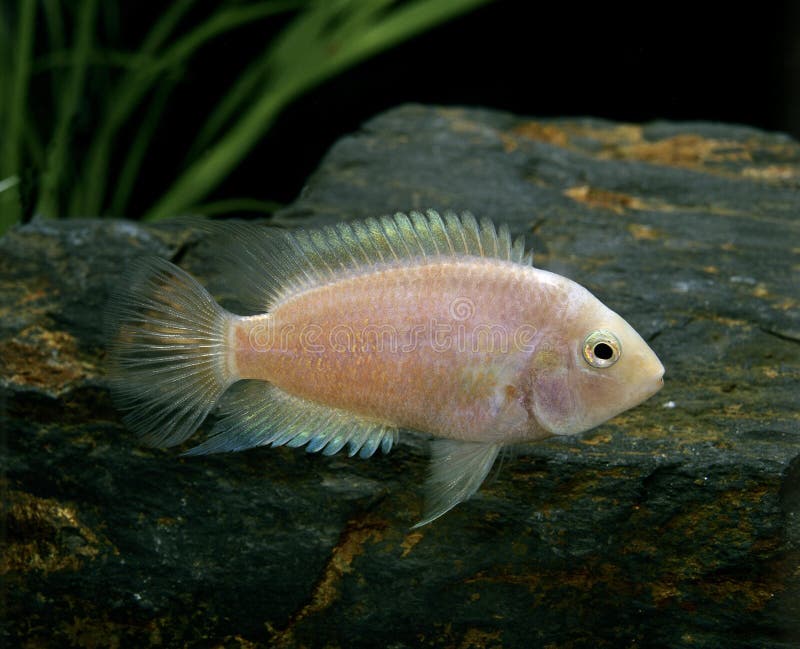
Albino Convict Cichlid, Cryptoheros Nigrofasciatus Stock Image Image
3 More Things to Know About Convict Cichlids. There are more than 1700 known species of cichlids. Convict Cichlids are extremely hardy fish - they can survive in a wide range of water conditions. Convict Cichlids don't have super specific needs with the pH, which is handy for housing them with other fish that might have more specific needs.